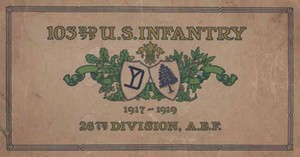
of the 26th Division of the U.S. Army
during World War I
 | The History of the 103rd Regiment of the 26th Division of the U.S. Army during World War I |
| Table of Contents | ||
| 8. ('uszmliies: 9 wounded and 5 killed. Enemy casualties unknown. No prisoners captured. 9. Observalinn and I?emm·ks: Throughout this raid there was no apparent connection between the enemy infantry and artillery. Several signals were thrown up by t-he enemy but no barrage fire resulted. Flares were thrown up continually. _ Indications are that enemy front line is strongly and persistently held, and in numbers fully equal to ours. Both light and heavy machine guns were encountered ccheloned in depth and all points covered by their {icld of {ire, making a ilanking movement very difficult. The above operation was a costly one, but, like the attack on Riaville was the sort of thing that had to be done. No one wished to be caught with an empty pocket in front of him; nt the same time with the sort of defensive tactics that the enemy was employing, namely, the withdrawal of infantry, positions being held by machine gunneis largely, it was difficult to determine in what strength the enemy were holding. Meantime the reorganization of the entire division seetor, Neptune, was to be eFEected: the 51st Brigade on the right; the 52nd on the left; the Brigntlc subseetor being liaumont, this regiment's center of resistance, Mamelle, with the 104th Infantry on our left. This called for an extension of the 103rd’s line to the right, while the 104th took over part of our left. At the same time it was eoutemplated and orders were issued to improve the defenses of the respective positions. Meantime encouraging reporls·1 were being received from the divisions to our left, and by November 5 orders were formulated for the part this regiment was to play in the attack that was sure to come. \\`ithin thc regiment 21 relief of the 3rd Battalion was etfected on the night ol November six and seven, the lst Battalion taking over the front held by the 2nd and 3rd Battalions, so that the regiment was organized in depth, the 2nd Battalion going into support and the 3rd into reserve. All three battalions were severely depleted, for they had been constantly in action since the first week in September; in the 2nd Battalion, Company F had been sent to Verdun to go into quarantine on accoimt of diphtheria. But these were days when there was no rest. The 3rd Battalion, which had gone into reserve with every expectancy of getting u. short rest after its tour at the front, was ordered to join the 79th Division, on the left, to take part in an | ||
| Original Version of Page |